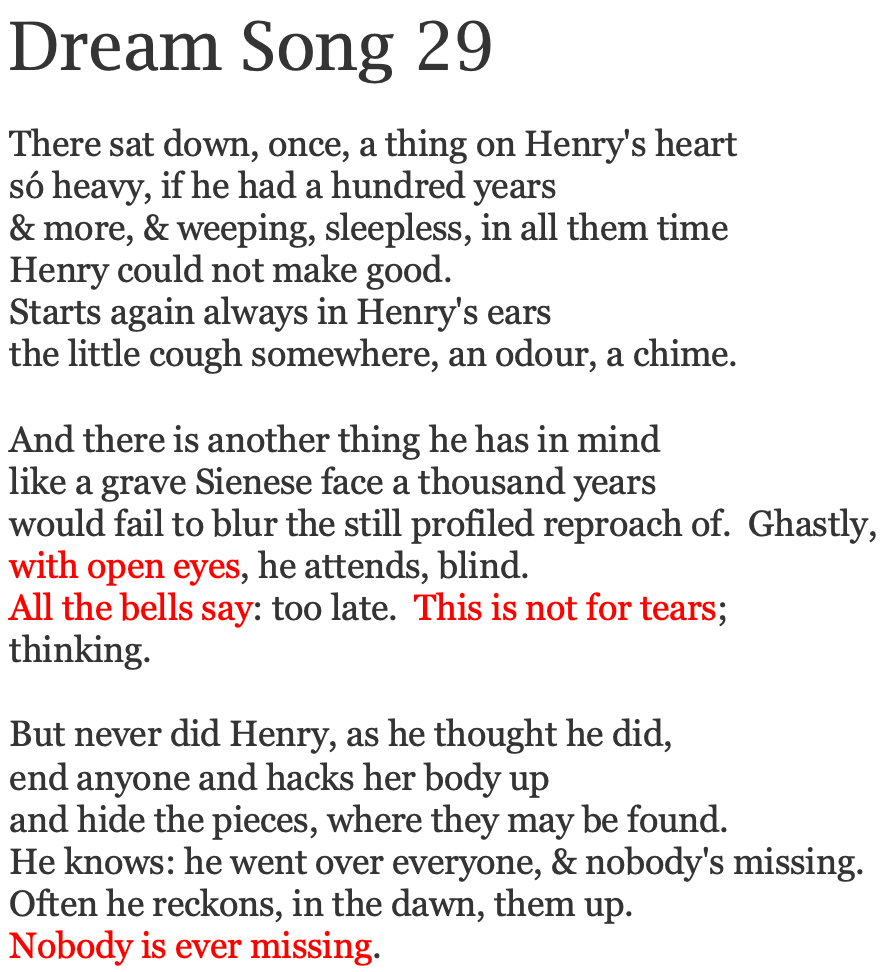



The final episodes of each season of Succession are all taken from the John Berryman poem Dream Song 29. Season 1’s "Nobody Is Ever Missing,” was followed by the second season’s "This Is Not For Tears,” which preceded season 3’s "All the Bells Say”, until finally the series finale gave us “With Open Eyes.
The Berryman poem is about a man who could not make good on a weighty burden, most likely the death of his father. The character feels unloved, and begins to question if he had in fact killed another person, but decides he did not.
It was written by Berryman at a time when , as he described to a friend, he did not feel like “a serious man” anymore.
When we last see Kendall, who has had several dalliances with waves, pools, undercurrents, eddies, and murder via drowning, he is contemplating the Hudson River. If not for the presence of his body guard Colin, who helped extract the scion from any consequences of the killing portrayed in Season 1, it wouldn’t be hard to imagine Logan Roy’s eldest boy (actually he’s not) throwing himself into the river. Drowning was the John Berryman’s means of suicide, specifically climbing onto a railing and keeling into a river flowing through an American metropolis. In life however, Berryman’s wit and ability to crack sad jokes was interwoven with the crushing sadness that characterized much of his life.
“Heel- spinning puns, coarse jokes, whether the end of it is funny or frightening, or both, I put up to the listener. “ - John Berryman. 1974
Sounds like an excellent TV show that just ended.
Nothing Else Matters
For the record, I do not think if the show continued for a few more minutes we’d see Kendall taking a header into the Hudson. This is different from the question of if Executive Producer Jess Armstrong didn’t want us to think he’d might. Jeremy Strong told Kara Swisher on the official Succession podcast that on one take he climbed over the railing, because it felt in-character. But Strong does ten different things on ten different takes, the explicit gesture toward self-annihilation was just the boldest of a pallet of choices that were rejected. This is in keeping with the ethos of Succession as a world where the characters were so insulated from worldly concerns that the normal stakes of drama do not apply. The Roys experienced no consequences except for one - that a loveless upbringing warps adults.
In the logic of the show there was a tumultuous Presidential election, but it only played out to us insofar as it shaped or was shaped by the main characters. There was online speculation that the final episode would feature riots, or that Kieran Culkin’s Roman might be torn to pieces from the mob he had wandered into at the end of episode 9. In fact, the only consequences of the mass protests was that Roman was personally wounded by it. The only hint of what was going on outside the world of Waystar Royco was a brief mention that a Wisconsin ballot recount might complicate the impending corporate takeover. Of course it didn’t, because Succession never cared about how the world might splinter apart due to the carelessness of the Roys. Succession was only interested in how every institution they degraded and cataclysm they countenanced played out within the psyches of these permanently maimed children. When characters, who should have been valued were discarded, the show purposefully didn’t follow up with them. Wronged presidential candidate Daniel Jiménez, sexual harassment victim Kira, an unnamed groundskeeper’s son tagged out at third, or loyal assistant Jess are not lingered upon, not visited later, not brought up again to confront the Roys. They cease to exist, as each old Jess is replaced with a New Jess.
People's essential selves don't change
Unlike the other TV shows in the pantheon Succession had a unique quality in that plot was incidental to character. In Breaking Bad, or the Sopranos, plot developments provided cliffhangers, peril, risks and stakes. The conflict in Succession was different. We didn’t really care if this deal or that deal went through, we didn’t even really care (some did, but shouldn’t have) who would actually succeed Logan Roy. All four Roy siblings, including the three we followed most closely, could never be laid low, except psychologically. No one was ever going to die, be arrested, become impoverished, or actually change. As Armstrong said during the Season 3 wrap-up interview “In my view, people's essential selves don't change. In a way that's what makes drama and choices interesting.”
Others would say that is the antithesis of the very idea of a character arc. But on Succession, the drama or tension wasn’t derived from conventional conflict. Unlike other, even great, TV shows the characters in Succession never made a choice that was out of character in order to bring about the next dramatic development. On Succession, character, however stunted and self-delusional, was all there ever was.
(ed. note: Specific details about John Berryman’s means of death, to illustrate the parallel to Kendall’s circumstance have been added)









Great one, Mr. Pesca! When you look at all of this through the lens of comedy and then, separately, as Shakespearean drama, It's Et Tu Brute "All The Way Down", yeah?
The subtitle of the piece is a lyric from that Hold Steady song. Berryman’s inclusion among a group of poets who drowned was also included in August: Osage County. I was not aware that he actually landed on the knoll. Thanks for bringing it to my attention.